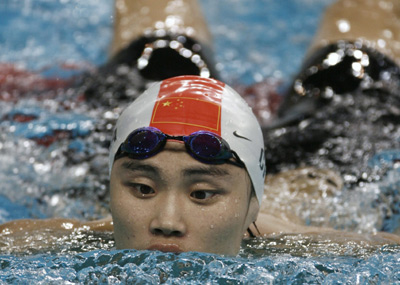OLYMPICS /
Team China
China defends life ban on swimmer Ouyang
Agencies
Updated: 2008-07-31 14:22
BEIJING - China has stood by the life ban imposed on Ouyang Kunpeng for doping, saying the swimmer's defence was unconvincing and athletes must take responsibility for the food and medicine they consume.
 China's Ouyang Kunpeng swims towards the edge of the pool after the men's 50m backstroke swimming heats at the 15th Asian Games in Doha in this December 7, 2006 file photo. China's top backstroke swimmer Ouyang has been banned for life after testing positive for a banned substance, the Chinese Swimming Association (CSA) confirmed on June 27, 2008. [Agencies]
China's Ouyang Kunpeng swims towards the edge of the pool after the men's 50m backstroke swimming heats at the 15th Asian Games in Doha in this December 7, 2006 file photo. China's top backstroke swimmer Ouyang has been banned for life after testing positive for a banned substance, the Chinese Swimming Association (CSA) confirmed on June 27, 2008. [Agencies] |
China's Anti-Doping Association deputy director Zhao Jian said the country's best hope of an Olympic backstroke medal at next month's Beijing Games claimed his positive test for the anabolic agent clenbuterol was a result of tainted food.
"According to anti-doping rules, individual athletes are responsible for all the food he or she consumes," Zhao told a news conference on Wednesday.
"The evidence that Ouyang Kunpeng provided did not fully persuade the panel at the hearing, so the panel did not accept his explanation and he will still be punished."
Ouyang was one of two athletes Chinese authorities banned for life following positive tests in the last month - along with wrestler Luo Meng - dealing the Olympic host nation an embarrassing blow ahead of the opening of the Games.
Zhao defended the Ouayang decision and said China had maintained a battery of tests on its elite athletes in the past year to ensure they were without suspicion when they compete at the August 8-24 Games.
Most experts believe the chances of drugs or hormones in food leading to a false positive drug test are very small.
"These things are very hard to prove," Zhao said. "Thinking logically, how can you recreate the situation at that time? Even if you can bring a sample to the panel, how can you prove that's what you ate?" he asked.
The 2004 Athens Olympics opened with a drugs scandal and witnessed 26 positive tests for banned substances.
International Olympic Committee president Jacques Rogge was quoted as saying as many as 40 competitors could test positive during the Beijing Games.